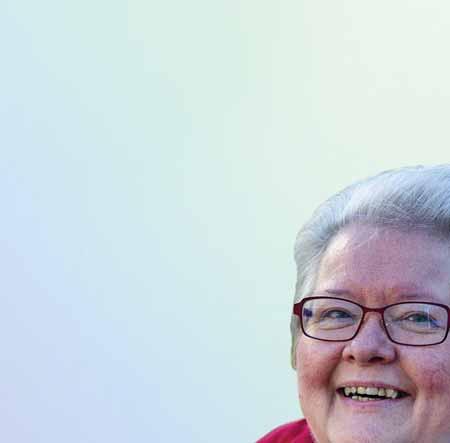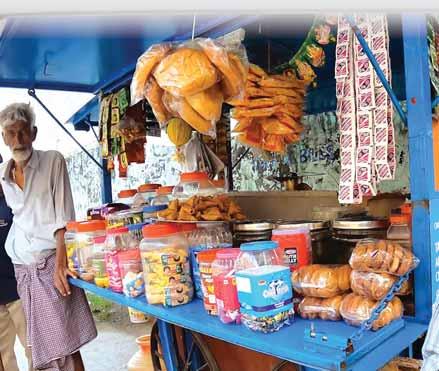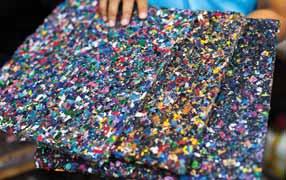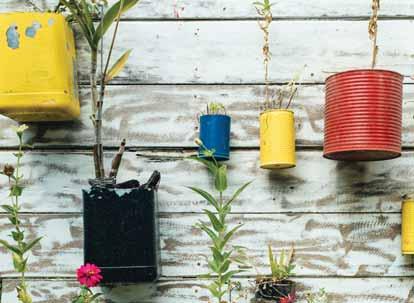
42 minute read
Empowering women through ornamental fish farming
Kiran Zehra
It is better to teach a man to fish than just giving him the fish. Here is a club that teaches rural women to breed exotic varieties of fish for their livelihood.
Advertisement
We aren’t just breeding fish, we are cultivating self-worth too,” says Manjulata Hembrum, a resident of Chunakoli, a riverside village tucked in the Sundarbans area of West Bengal. Adopted by RC Bhubaneswar Ekamra Kshetra, RID 3262, in 2014, the village has since seen “only good days. Almost every woman in the village can read and write, sign her name, all thanks to the adult literacy centre set up by the club. Some of us have enrolled in multiple skill development programmes conducted by the club which helps us earn a living and raise our voice against domestic violence,” she adds.
Starting with the club’s adult literacy centre Swabhiman Kendra, to the skill development programmes that teach making cloth bags, incense sticks, growing mushrooms and promoting ornamental fish farming as a livelihood option, the club is focused on making the village women economically independent. “When a woman is empowered to manage a small business and her home, as an earning member of the family she slowly realises her potential to contribute towards the holistic development of not just her family but her community too,” says club president Dr Bani Sen Gupta.
Fifteen women from this village were recently selected as beneficiaries for an ornamental fish farming initiative by the club, in association with the Central Inland Fresh Water Research Institute (CIFRI). The beneficiaries were taken to CIFRI, Barrackpore, for a three-day training programme in February. The expenses for travel, food, lodging, training and study material which otherwise cost `30,000 a beneficiary were taken care of by the CIFRI. “This was possible only because of Basanta Kumar Das, president of RC Bhubaneshwar Royal who is the director of CIFRI,
When a woman is empowered to manage a small business and her home, as an earning member of the family she realises her potential to contribute towards the holistic
development of not just her family but her community too.
Women get trained in fish farming.
Being natural nurturers, women understand the fish breeding process, and can quickly develop the skill to prepare feed, treat sick fish and care for the newborn fish.
Barrackpore,” says Bani. During the lockdown when the women had to stop making cloth bags and incense sticks as sales came to a standstill, “Das suggested that ornamental fish farming will keep them occupied until the fish breed and generate a steady income once the lockdown was lifted,” she adds. After the training each of them received fibreglass portable fish tanks, equipment, fish feed and fish fingerlings in the presence of PDG Sibabrata Dash.
Ornamental fish breeding which started as a hobby around the world has turned out to be a commercial trade activity, explains Das. The major export destination for Indian ornamental fish are Singapore, Japan, USA, Malaysia and Germany. “This sector has been recognised for its ability to generate employment opportunity, alleviate poverty and contribute towards national growth by promoting international trade,” he says.
Rameswar Das, a local trainer and entrepreneur in ornamental fish farming who handles the training for this initiative, says that being natural nurturers, women understand better the fish breeding process, and can quickly develop the skill to prepare feed, treat sick fish and care for the newborn fish. “They apply their hearts to it because their families depend on them for food. They are determined to improve the lives of their children even if that means doing menial jobs in the fish market like cleaning fish, or peeling, and de-heading shrimps. Ornamental fish farming helps them earn a little extra without the intimidation of looking for employment outside their homes.” To make matters easy for the rural women Das has offered to pay the auto fare for those visiting his shop in Bhubaneswar to trade their ornamental fish or clear their doubts on the subject. The women from Chunakoli are currently nurturing six species of ornamental fish such as goldfish, zebra danio and black widow tetra.
Mushroom cultivation
Also undertaken by the club during the lockdown was a mushroom cultivation programme for women from Damana Basti near Bhubaneswar. A partnership with the Horticulture Department of Malkangiri through Rtn Gopinath Kar, horticulture officer and member of RC Bhubaneshwar Confluence, led to the training of 15 underprivileged women. Bani funded and sourced the raw material for these women to start mushroom cultivation in their own homes at a total cost of `4,500. The initiative has taught them to make the right kind of compost, harvest and cultivate mushrooms. Lessons on how to spawn and multiply a harvest were also imparted to them. “This is an easy method that can be done indoors and does not need much space. The beneficiaries have completed the second harvest of oyster mushrooms and are beginning to grow button mushrooms for the summer,” says an excited Bani.
The club members visit both projects regularly to check on the development and have transformed the village school in Chunakoli into a Happy School with gendersegregated toilet blocks, a library, and a well-maintained campus. On the occasion of International Women’s Day, the club conducted a seminar on women’s rights followed by a cultural programme. Bani says, “We want to catch them young and make the girls aware of important things. They also know that whenever required, they can reach out to us or local authorities. We will be carrying out more such awareness drives in the future.”

Women in Damana Basti near Bhubaneswar being trained in mushroom cultivation.
Tracing the growth of Finnish women

t 34, Finland’s PM Sanna Marin became the world’s youngest prime minister in 2019, and her cabinet has a majority of women members. Women in Finland enjoy a high degree of equality and their position in society and business is well-respected.
RI Director Dr Virpi Honkala from Finland shared this fact while addressing a zoom meet on ‘Women in Finnish society and Rotary’ organised recently by the Rotary International Women’s (RIW) group. The group formed in April last year has women Rotarians from across 30 countries and has recently got the RI approval for its Rotary Action Group for Menstrual Health and Hygiene.
Virpi chronicled the growth of women in Finnish society. Finland was part of Sweden for almost 700

Jaishree
years from 1150 until the Finnish War of 1809, after which it became an autonomous part of the Russian Empire as the Grand Duchy of Finland. It became an independent country in 1917.
The country was voted second in the Global Gender Gap Index on women’s rights and is among the top countries for women’s equality. In 1906 Finland became one of the first countries to grant women the right to vote, and contest elections. “We were the third country in the world after Australia and New Zealand to enjoy this right. The very next year,
RI Director Dr Virpi Honkala
We were the
third country in
the world after
Australia and New
Zealand to enjoy
the right to vote.


19 women were elected as MPs — the first in world history!” recalled Virpi.
The country’s Government Action Plan for Gender Equality proposed in 2003 included over 100 issues that needed discussion such as promoting equal pay for work of equal value, increasing the number of women in political and economic roles, assessing gender equity from the male point of view, prevention of domestic violence and intimate partner violence and protecting victims of trafficking.
Virpi is the head of surgery and a medical director at the Raahe Hospitals in Finland. When she qualified to become a general surgeon in 1986, “it was just about then that things had changed. In the early 1970s and 1980s some vocations such as pilots, chimney sweepers, bus drivers, pastors and surgeons were open only to men. But by the time I graduated more than 50 per cent of incoming medical students were women.”
In 1919, women were granted the right to work in offices for salary without the husband’s consent. “This may sound weird today. But at that time this was quite a revolutionary decision,” she smiled. Wife-beating was declared illegal as early as 1860 and in 1878, both men and women were given equal rights to inherit property. In 1901, women were given equal rights to attend universities.
The RI director recalled that her grandmother attended elementary

If the menstrual cup is
good for the environment
and the next generation is
comfortable with it, let’s
promote it. classes in 1897 in what was called ‘rotating schools’ as it was conducted in various houses in turns. “She learnt basic math, and to read and write.” Virpi’s mother served at the war front as a volunteer in 1941. The country has a law for maternity allowance since 1937 and one for maternity and child health checkup since 1944.
More recently and since 1994, marital rape is considered illegal; in 1999 the government abolished regulations on homosexual acts and adultery and from 2011 transvestism is no longer considered a ‘disorder’. In 2019 the country banned marriages of minors.
Women in Finnish Rotary
While Rotary first arrived in 1926 in Helsinki, after 1987 when Rotary started admitting women members, RC Helsinki has seen three women presidents, one of them even holding the office twice. Virpi was the first woman district governor in 2008–09 and the first woman RI director from the country. She is all for the Diversity, Equity, Inclusion statement adopted by the RI board in Jan 2019.
Talking about menstrual health management (MHM) among adolescent girls in Finland, she said that the schools educate the girls well in advance. “The situation is good here,” she replied, to a question from an RIW member about the availability of proper infrastructure, especially for adolescent girls in schools.
Talking about her experience as a woman RI director, she said that it has been most interesting. “Decision making is based on discussions and it takes a lot of reading and background checks to try to understand various issues.” She acknowledged the suggestion from Sharmila Nagarajan, RIW’s founding member from the UK, to have a separate action group for menstrual health management and not
Men need to have the knowledge
of what menstruation means.
It is important to empower
girls and ensure their success
in the world.
as a part of WASH RAG. “The early laws were approved by men but behind all these improving laws there are a group of powerful women lobbying and explaining why MHM is imperative.” Women across the world had faced issues relating to menstruation. “They were thought of as unclean, but all that is far behind us now. Men need to have the knowledge of what it means. It is important to empower girls and ensure their success in the world. I would vote for you,” said the RI director.
PDG Shyamashree Sen requested her to push the RAG forward with RI. “Yesterday when I heard our incoming RI president Shekhar Mehta talking about empowering the girl child he only spoke about the washable cloth napkin.” Probably most men had no knowledge about the cup. “In our country we do not talk about menstruation with men because we are still embarrassed. But we need to initiate this dialogue,” she said.
The menstrual cup needs more exposure. Women need to know how it is better than sanitary napkins, said Sharmila, adding that even in the UK, not many supermarkets stock menstrual cups. They have biodegradable napkins though.
“If it is good for the environment and if the next generation is comfortable with it, let’s promote it”, said Virpi.
Tailoring skills enhance livelihood for rural women in Thanjavur
It was a defining moment for Savitha Prabhakaran (48) when she received a sewing machine with certificate at the pass-out ceremony. Having lost her husband at a young age, she had to eke out a living as housemaid for years before RC Thanjavur South, RID 2981, offered a threemonth training programme in tailoring at its vocational centre.
She almost burst into tears and was speechless after receiving the sewing machine, but managed to say, “now I can look forward to enhance my livelihood with this facility.” Her batchmate Kannagi P (51) who takes care of her bedridden husband said confidently that her monthly earnings would raise manifold with this new vocation. These two women were among the 68 who received certificates for completing the course, “but sewing machines were given to only two of them,” says S Prabhu, club president.
Last year (2019–2020) the club gave 11 electronic machines with district grants. Deserving students were chosen through a set of criteria such as punctuality, 100 per cent attendance, skill development and value-addition for donating sewing machines to them, with preference for widows and destitute. Since 2012, the vocational centre has trained 1,056 women in tailoring through four batches annually. “We had closed down the centre for 10 months during the corona lockdown and restarted it last November,” he says. “Free tailoring classes are held for 96 women in a year. This year we had only 68 candidates due to the pandemic.”
Speaking at the passout ceremony, Mohamed Ehiya, chief guest and a club member, urged the rural women to form groups and “take up value-addition in tailoring to embellish their finished products that would fetch them high income.” A jet-setting industrialist with 14 business ventures in Kenya, Dubai, Europe, US, Singapore and Malaysia, Ehiya also runs a training centre ( computer, tailoring) near his residence at Nadukkadai in Thiruvaiyaru, Thanjavur district. “Ehiya is keen to sign an MoU with our club to get skilled manpower for his garment factory in Bengaluru,” says Prabhu.
A self-sufficient club With 94 members, the 43-year-old club has seven out of 13 endowment donors in RID 2981 and 10 major donors. “We have our own
V Muthukumaran

Club President S Prabhu (second from L) and Rtn Mohamed Ehiya (third from L) hand over a sewing machine to a beneficiary.
hall — Rotary Arulananda Swami Nadar Indoor Auditorium — built in 1983 at a cost of `50 lakh.” This premises has a sprawling hall on the ground floor, the vocational centre run on the first floor, a terrace garden and an adjoining food court with a total built-up area of 5,300 sqft. Recently, the building was renovated with new interiors. “We have surplus cash reserves and all RI norms are being followed with annual dues remitted in time,” says Prabhu.
The club sponsors RAC Bon Secours with over 1,500 Rotaractors (rural girls) and Interact Club of Little Scholars with around 1,400 Interactors. So far, the club has given `2.43 crore to TRF. A Smart classroom was donated by its RCC to the Government Higher Secondary School at Ambalapattu through a matching grant project. The club donated 15 bench-desks, and cupboards and racks for the library to the Government HS School, Panayakkottai.

Students in a smart classroom sponsored by RCC Ambalapattu.
An innovative sapling project from RC Kangra
If you drink nariyal pani (tender coconut water) in Kangra, Himachal Pradesh, you wouldn’t have to throw away the shell. RC Kangra, RID 3070, under its environmental protection campaign is giving out succulent and shallow root plants to the tender
Team Rotary News
coconut vendors in the city who fill the emptied coconut shell with soil, coco peat or husk and plant a sapling on it for you to take back home and grow. “We have received outstanding response for this project,” says club president Sunil Dogra, adding that

DG CA Davinder Singh (L), his wife Dolly Sachdeva and club president Sunil Dogra (R) with the coconut shell planters. “the best part is that the coconut shell plant is given free. All you have to do is take it back home and water your shell plant which can be grown into a quirky garden.”
Since coconut shells are biodegradable, they make a fine medium for nurturing saplings which can be transplanted easily into the soil along with the shell after sometime. “Coconut husk is an excellent medium as it contains sugar, minerals, amino acids and vitamins,” says Dogra. Inaugurating this eco-friendly project, DG CA Davinder Singh appreciated the club for its innovation to usher in a clean, green environment.
On the first day of the project, the club had given out over 5,000 saplings. “The club will follow up with the local vendors and give them saplings as and when they exhaust their stock of plants,” adds Dogra.
Empowering the differently-abled
Jaishree
Physically-challenged Gunasekaran was all smiles as I greeted him on a Sunday morning at the Builders’ Association premises. His radiance outshone his physical disability. “Today, thanks to these big-hearted Rotarians, I am in a far better position financially. Six months ago I was in dire straits literally, and the Covid pandemic only worsened the situation,” he said. Owing to his disability he could not get a steady employment and was surviving on odd jobs. Rotary Club of Chennai Greencity, RID 3232, provided him a push cart and working capital and he is now happy to be selling snacks and earning an average of `500 a day.
Gunasekaran is one of the initial beneficiaries of the club’s pilot programme — distributing push carts to help enhance the livelihood of differently-abled people. The project took shape in July 2020 when Dr P Simmachandran, president of the Tamil Nadu Differently-abled Federation Charitable (TNDFC) Trust, requested club member Haricharan to provide a computer. Further discussions brought to light the difficulties faced by the differently-abled, especially during the pandemic. “Some of them who were earlier engaged as domestic help and those selling wares at bus stands or railway stations took a hit during the lockdown. They requested us, through the TNDFC, to help them with a means to earn a livelihood and that is how we zeroed in on this project which we call Maatrum Thiran (Alternate skill enhancement programme),” said club member S N Balasubramaniam who is also the district chairman for community and economic development.
With the success of the pilot he, along with the district director for community development and health Dr R Sriram, scaled it up to the district level and called for all Rotary clubs of RID 3232 to pitch in. DG S Muthupalaniappan urged the team to provide 100 push carts by the year-end. The clubs geared up to the proposal and by January 2021 forty carts were distributed with RC Chennai Mambalam sponsoring the highest — 10 carts. The beneficiaries have put up various forms of stalls ranging from food to vegetable/fruits, books, plastic ware and other knick-knacks.
Fifteen more carts were distributed recently at an event in the presence of RIDE A S Venkatesh and DG Muthupalaniappan.
Gunasekaran, a beneficiary, with his push cart given by RC Chennai Greencity.



From R: RIDE A S Venkatesh; DG S Muthupalaniappan; S N Balasubramaniam, district chairman, Community and Economic Development; Dr R Sriram, district director, Community Development and Health; and DRFC M Ambalavanan with a beneficiary.
Kalpana, a polio victim, who was looking after children in a primary school had lost her job due to the pandemic. “This push cart is a godsend for me now. I plan to sell women’s clothing,” she said. Her neighbour Rajeswari plans to sell soups, pakodas and snacks prepared by her daughterin-law on her push cart. The excitement and vibes of hope was palpable as the beneficiaries, some crawling and others limping, and some with little children in tow, gathered at the distribution hall where the carts were parked.
RIDE Venkatesh, speaking at the event, recalled an incident when
We thank each one of you for giving
us a chance to help you. Rotary is all
about service and we need a platform
to serve. You have given us that.
A S Venkatesh RI Director Elect he visited a medical camp in Kenya, Africa. “The US Rotarians who were the organisers thanked the African patients for giving them the opportunity to serve. Similarly, we thank each one of you for giving us a chance to help you. Rotary is all about service and we need a platform to serve. You have given us that,” he told the assembled beneficiaries and commended the community service team for providing “a complete package including the mobile cart and working capital to run the business. Providing them just the cart without giving them the means or the knowhow to do business would be a sheer waste.”
DG Muthupalaniappan said, “This is a perfect way to promote Rotary’s public image as one can see the Rotary logo in a hundred places across the city.” Talking about the district’s signature project — Project Orange — which will be addressing avoidable blindness in a big way, he said, “We are planning to establish 200 eyecare centres across RID 3232 at a cost of `30 crore. It is a huge milestone for, even in the last 15 years, only 70 centres have come up in Tamil Nadu.” He congratulated RC Chennai Greencity president S R Kumaran for initiating the project for the differently-abled.
The beneficiaries are identified and monitored for two years by TNDFC and the push carts are fabricated at the unit of Panjanathan, a member of RC Madras West at a cost of `30,000 each. Rotary clubs/individuals sponsoring the carts will pay the money to TNDFC and IT exemption under Sec 80G can be availed by the sponsor. The carts, painted blue, sport the Rotary Wheel and the sponsoring club’s name.
An orientation workshop was organised to teach the beneficiaries how to avail bank loan and the various government schemes available for them. “We even extend revolving fund assistance to the needy and assist them in solving business-related issues,” said Balasubramaniam.
Five initial beneficiaries were recognised with certificates for their performance at the event.
RAGs — an integral part of Rotary John Hewko
Kiran Zehra


Congratulating the RI Women’s group for getting the RI board’s approval for its Rotary Action Group for Menstrual Health and Hygiene (RAG-MHH), RI General Secretary John Hewko said, “this grant model that we introduced in 2013 is the most important initiative that Rotary has undertaken since the polio initiative that began in the 1980s. In many ways it represents an important component of our organisation’s future, apart from the increased benefits this will have for the beneficiaries.” Calling RAGs larger and more scalable he pointed out that they serve as great public image boosters locally, regionally and internationally that in turn, will drive more members and potential donors to TRF.
RAG-MHH will act as a tool to make an impact by providing relevant resources to Rotarians who want to implement such projects in their regions. “We have put together these groups to try to get more bang for our buck.” RAGs are focused on specific topics and issues. So “rather than solving one percent of 100 problems, let’s solve 100 per cent of one problem and in this case, it would be menstrual health and hygiene,” said Hewko.
Recalling the time, he worked in the George W Bush administration to set up a foreign assistance agency that forms partnerships with developing countries committed to good governance, economic freedom, and investing in their citizens, he said that several of the programmes had to do with primary school education for girls. “But it’s not as simple as just saying, they need a building. They need much more — separate toilet facilities, meals, teachers, curriculum, safe space to study… I urge you to partner with other RAGs, in your case with WASH, to scale up your work and make a true impact. One of the greatest interventions you can do in global development is providing girls education.” He asked the women’s group to think in terms of long-term sustainable projects that are comprehensive and deal with the whole panoply of issues that need to be addressed rather than working on a specific issue. Membership and Covid Referring to the stagnant membership of 1.2 million members for the last 25 years he said, “It is similar to a product we sell in a marketplace. Here, we are not selling soap or bread. We’re selling experience… the experience you get when you join a Rotary club, and you pay for that experience with your time and money.” He pointed out that it is time to “rethink our product, those areas where we need to strengthen and ask ourselves if we can offer something different in the market that potential members may find more attractive?” The RAGs, he said, could play a critical role in refining and improving this experience.
Not denying that Rotary has seen a “slight decline in membership,” Hewko reminded that “there was only one time in our history where we saw a significant drop in membership — two years after the depression in the 1930s.” The membership dropped a little over five per cent. “For each

one per cent decline in membership globally, there is $800,000 loss of revenue to Rotary. So when there is a five per cent loss in membership, that represents about a $4 million loss of revenues. Fortunately, Rotary, through the years, has been prudent with your money; both RI and TRF have very solid reserves, more than adequate to overcome these crises. Rotary operationally and financially is on a sound footing.”
Answering a question as to how Rotary reacted to the Covid crisis, Hewko stated that shortly after the Covid crisis began, the TRF board created a Covid disaster response fund, which eventually grew to $7 million where each Rotary district was able to apply for a one-time $25,000 grant for Covid related activities. More than 300 districts received these one-time grants.
“That fund has now been exhausted and an additional $20 million of global grants were approved for Covid relief. Within the first few months of this crisis, we moved over $30 million worth of funding for Covid-related activities. And that, of course, doesn’t even begin to touch all of the extraordinary efforts that Rotarians have done at the club, district or regional level.”

Sewing machines donated to needy women in Patiala
Team Rotary News

Fifteen sewing machines were presented, along with course completion certificates, to the first batch of the Free Stitching Centre being run by RC Patiala Midtown, RID 3090.
The vocational training centre was started in memory of late Rtn Vidyasagar. His wife Suman Sagar sponsored the sewing machines. The centre functions at the Rotary Bhawan and the project is led by a three-member team comprising Rajiv Bansal, N K Jain and Yashwinder Singh. Lal Vishwas, joint commissioner, Municipal Corporation of Patiala, who was the chief guest at the event, appreciated the club for running the vocational centre. Club president Manik Raj Singla and secretary Vishal Sharma were present along with other Rotarians.



On 26 June 2020, then- Rotary President Mark Daniel Maloney made a momentous announcement: The environment would become a new area of focus for Rotary. It was one of the final achievements of a term disrupted by the Covid-19 pandemic and capped by Rotary’s first virtual convention. “Ultimately, the proposal passed the Trustees unanimously, the Board approved it unanimously, and I had this great satisfaction — sitting in my living room,” Maloney said during a recent interview over zoom.
The moment was built upon decades of Rotarian interest. In 1990–91, Rotary President Paulo V C Costa made the environment a focus of his term, creating the Preserve Planet Earth Committee to look at ways clubs and members could carry out environmental initiatives. Surveys have found that the environment is one of the top-ranking causes among members of the Rotary family.
Over the decades, Rotary members have carried out thousands of projects to protect the environment. In just five years, global grants totaling $18 million have funded projects that help support the environment while also focusing on one of Rotary’s causes, such as providing clean water and sanitation, growing local economies, and supporting education. Now that the environment is itself one of Rotary’s causes, members have even more opportunities to focus on issues that are important to them.
“The boundless creativity, enthusiasm and determination of Rotarians everywhere, combined with their willingness to take on significant problems, make them particularly suited to make an impact on the environment,” says 2017–18 RI President Ian H S Riseley, who chaired an environmental issues task force that championed the new area of focus.
Read on to find out how Rotary members have already been supporting


In our nature
Diana Schoberg
the environment and to learn about new kinds of projects that will be eligible for global grant funding from July 1.
Recycling
In Campo Mourão, Brazil, only five per cent of garbage is recycled, and workers at the local recycling facility lacked the equipment needed to increase productivity. Without a conveyor belt, they had to sort recyclable materials at tables and move them by hand, requiring extra time and effort. And their outdated press was slow and created bales of recyclables that were smaller than standard for the regional market.
Working with a local environmental programme that coordinates the recycling cooperative, members of the Rotary Clubs of Campo Mourão and Little Rock, Arkansas, developed a project to increase workers’ capacity to separate and process recyclable materials, providing both economic and environmental benefits. The project, supported by a $33,066 global grant in the community economic development area of focus, funded the purchase of equipment to improve worker safety and efficiency and provided environmental and financial training. Workers sorted an additional 2.63 tonnes of recyclables per month after the grant project was implemented, and their income increased nearly 25 per cent per month.
Solar lights
In the remote villages of Ndandini and Kyaithani in eastern Kenya, families live on less than $1 per day, and their homes are not connected to any electrical grid. Most cannot afford kerosene or paraffin to light their homes, which means students cannot see to do their homework in the evenings.
Members of the Rotary clubs of Sunshine Coast-Sechelt, British Columbia, and Machakos, Kenya, learned about the problem while working in the area on other projects. In 2014, the Rotarians embarked on a project, supported by a $101,564 global grant in the basic education and literacy area of focus, to bring environment-friendly solar power into homes and schools.
About 1,500 students attending local schools were each provided a solar light under a rent-to-own programme; students pay $1 per month, less than the cost of paraffin, for eight months, after which they own the light. The proceeds are used to provide another student with a solar light the following year. Project partner Kenya Connect, noting that the time students spend reading has tripled with the introduction of the solar lights, described the programme as “a gamechanger in our efforts to improve the quality of education for rural schools.”
The grant, combined with funding from The Rotary Foundation (Canada) and the government of Canada, also created computer labs at two schools and a solar system to provide enough power for the entire setup. More than 200 teachers received training on digital learning and ways to better make use of computers in their teaching.
Water diversion
Residents of two communities near Aurangabad, India, get their water from wells that are recharged annually by monsoon rains. But within a few months after the rains end, the wells run dry, and community members either must go further afield to fetch water or must buy it, which many cannot afford.
Members of the Rotary Clubs of Aurangabad East and Chatswood Roseville, Australia, collaborated on an eco-friendly solution using a simple, traditional technology: check dams.

Alf Ribeiro
These small dams are constructed across gullies to control the rate of stormwater flow. They decrease erosion and increase the amount of water that percolates into the ground. More than 200,000 check dams have been built across India for this purpose; a check dam constructed in India in the second century is one of the world’s oldest water diversion structures still in use.
In Aurangabad, the monsoon rains flow via a channel across a government-owned sports training centre toward the sewage-contaminated Kham River. Supported by a $36,500 global grant in the water, sanitation, and hygiene area of focus, Rotary members funded the construction of two concrete check dams on the campus. The increased percolation of the monsoon rains into the ground is expected to lengthen the period each year during which the area’s 20,000 residents can obtain water from their wells. The dams have an anticipated life span of 75 years and require little maintenance.
Water conservation
A series of global grant projects of the Rotary Clubs of Haifa, Israel, and Coral Springs-Parkland, Florida, is using an environmental education programme to unite students of different cultures and beliefs around a topic of mutual importance in the desert region: water conservation. Students from 60 schools participated in the second phase of the project, which was supported by a $152,723 global grant in the peacebuilding and conflict resolution area of focus. Schools selected research topics of interest related to water conservation or technology, such as desalination, rainwater harvesting, or water leaks. The teachers and students were supported in their science projects through equipment and connections with experts such as engineers, biologists, or physicists. More than 150 teachers received training in 26 training events.
Most schools in Israel are separated by culture or religion, whether Jewish, Muslim, Christian or Druze. Through the cross-cultural component of the global grant project, students visited one another’s schools to see the research projects and came together for joint field trips to visit industry facilities or to hear related speakers, giving an opportunity for interaction that they didn’t have otherwise.

Sustainable farming
The Indigenous Tarahumara people live on the remote slopes and canyons of Mexico’s Sierra Madre mountains, growing ancient varieties of corn and beans for sustenance. But the seeds for these plants, handed down through generations,


Suprabhat

Inti Ocon were wiped out by a prolonged drought. In the wake of the resulting widespread hunger, many young people and women with children left their homes to beg on city streets.
Members of the Rotary Clubs of Chihuahua Campestre, Mexico, and St Augustine Sunrise, Florida, worked with a nongovernmental organisation called Barefoot Seeds to facilitate community discussions with Tarahumara leaders to come up with solutions. Community leaders said they wanted seed banks and improved water storage to support continued subsistence farming.
A project supported by a $49,900 global grant in the community economic development area of focus established seed banks, demonstration farms, and plots to grow additional seeds using sustainable farming methods; reintroduced goats to improve soil fertility; installed rainwater harvesting equipment; and provided training. The project also provided solar-powered chest freezers to further extend the shelf life of stored seeds. At least 500 Tarahumara farmers received seeds, goats, or improved water access the first year.


Eco-stoves
A traditional wood fire for cooking produces the equivalent of 400 cigarettes’ worth of smoke in an hour. With around three billion people around the world still relying on such fires — many of them inside the home — more people die from indoor air pollution than malaria, tuberculosis, and HIV/AIDS combined, according to the World Health Organisation. Additionally, the black carbon emitted from these fires, which absorbs sunlight, is believed to contribute to climate change, while the need for wood drives deforestation.
Members of the Rotary Clubs of Guatemala del Este and Los Angeles, California, worked together to help families living in San Lucas Tolimán, Guatemala, on the southeastern shore of Lake Atitlán. The lake, which is the primary source of drinking water for communities including San Lucas Tolimán, is severely contaminated in part because of storm runoff from areas where trees have been cut down for fuel for cooking fires. Supported by a $160,000 global grant in the disease prevention and treatment area of focus, the project provided 1,000 families with eco-stoves that vent to the outside and decrease the amount of firewood needed by 70 per cent. Each stove is expected to reduce carbon emissions by 3–4 tonnes per year.
Clean energy
The Berlin Polyclinic has been the main provider of primary healthcare in Gyumri, Armenia, since it opened in 1993 after a
devastating earthquake in the region. But access to healthcare there remains limited. In conversations with medical centre representatives, members of the Rotary Club of Gyumri learned that the clinic’s ability to serve patients is significantly hampered by drastically rising energy costs: In the past decade, the cost of electricity has gone up 200 per cent, natural gas 70 per cent, and water 50 per cent. Those increases, combined with inefficient heating and water heating systems, had forced the clinic to cut its hours of operation during the region’s long winters. As a result, during the heating season — which runs from October to April — the clinic saw an average of 25 to 30 per cent fewer patients.
In 2017, Gyumri Rotarians worked with the Rotary Club of North Fresno, California, on a project — supported by a $101,000 Rotary Foundation global grant in the maternal and child health area of focus — that both increases patient access and benefits the environment. The installation of photovoltaic panels, a solar hot water system, solar heat pumps, and LED lighting was projected to reduce annual energy costs by 80 per cent, allowing the clinic to operate at full capacity year-round — and reducing carbon emissions by 50 per cent in the process. During the first winter heating season with the new system, the number of patients served increased by 32 per cent.
How ‘the stars aligned’
We spoke with 2019–20 Rotary President Mark Daniel Maloney about why Rotary decided to make the environment an area of focus, and about how Rotary members have responded.
Why did you think it was important that Rotary make the environment an area of focus?
I’m not a tree-hugger, but I have grave concerns about climate change as an issue that will affect my grandchildren and future generations. And I must admit to a selfish motivation: I was concerned that we were missing the boat. In surveys of Rotarians, Rotaractors and potential Rotarians, the environment is one of the top five causes for every group. For the general public — prospective Rotarians — it was their No 1 cause. That prospective Rotarian would go to the Rotary website and look at our causes, not see the environment listed, and move on. I saw it as an issue of Rotary’s relevance, in addition to being something we need to do substantively. One of my emphases as president was to grow Rotary, and I saw not having the environment as one of our causes as a hindrance to growth.
Before the Board and Trustees votes, what were you hearing from Rotarians about the environment?
In June 2019, while I was presidentelect, I made a trip to the Philippines to celebrate the centennial of the Rotary Club of Manila, the first Rotary club in Asia. It wasn’t just a celebratory banquet. There was a day of speakers, and I was invited onstage as part of a roundtable discussion with then Rotary International Director Rafael Garcia and several RI presidents and directors as well as past and current district governors. The other panellists asked me questions. Here we were, on the stage with high-level business people, and more than half of the questions dealt with the environment. That really made an impression on me. But it wasn’t just in the Philippines. I’ve encountered questions about the environment all over the world: in South America, at the Brazil Rotary institute. At the 2019 Rotary International

Convention in Hamburg. At a Rotaract event in Surat, India.
The environment task force was set up in October 2019, and the new area of focus was approved the next June. How was this accomplished so quickly?
We were making progress toward having the 2020 Rotary Convention in Honolulu certified as a green convention before it was moved online due to the pandemic. We were partnering with the Environmental Sustainability Rotary Action Group and the Water, Sanitation, and Hygiene Rotary Action Group to hold an event on World Environment Day on June 5. This was all coming together to bring the environment to the forefront in Rotary. I think it just took somebody willing to push a little. Frankly, I didn’t have to push that hard. The stars had aligned. You had the president of Rotary and several past presidents serving on the Board of Trustees who wanted it to happen.
How do you respond to Rotarians who say this isn’t Rotary’s business?
I have not encountered that. I know when you start talking about climate change in the United States, there are some issues with terminology. But frankly, outside of the United States, I think there’s a great deal of lack of comprehension about why there’s such opposition here.
We’re not forcing anybody to do anything. We’re not taking a political stance. This is an avenue that, if you’re interested in doing a project with an environmental impact, gives you the opportunity to access funding through global grants. We are responding to what Rotarians want to do: Rotarians want to address environmental issues.
The environment Rotary members were already able to use global grants to fund projects that benefit the environment through the existing areas of focus. So what’s new?
Under the environment area of focus, Rotary members can tap into global grant funding specifically for initiatives such as: Restoring habitat, planting native vegetation, and removing invasive plant and animal species Protecting endangered species and preventing illegal wildlife trade Addressing overfishing, pollution, and coastal erosion Educating communities in conservation and resource management Supporting eco-friendly agriculture and sustainable fisheries Promoting the use of traditional and indigenous knowledge in resource management Supporting the transition to energy- efficient transportation Eliminating exposure to environmental toxins Reducing food waste.

Like all global grant projects, those under the environment area of focus will require a community assessment and must be sustainable. Projects that will not be eligible include community beautification projects, single-event cleanups, tree plantings that are not part of a broader strategy, and outdoor recreation initiatives.
Applications under the environment area of focus will be accepted starting July 1. Learn more at rotary.
The 5Rs of waste management
Preeti Mehra






It may seem unlikely. But believe me, small changes can make a big difference. This maxim also holds true if you are serious about handling the waste in your home in an environment- friendly manner. All you have to do is incorporate the 4Rs principle into your daily routine. And for those who wish to take the sustainable path to the next level, simply add the 5th R.
The 4Rs can be distilled into the following mantra: Refuse, Reduce, Reuse, Recycle, with the 5th being Recover. I started my 4Rs home project by fixing a large sticker on the refrigerator that prominently showed the familiar recycling sign of three green arrows chasing each other. This will typically remind you of what needs to be done with every object in the house that you feel has finished its use — in technical language they call it the ‘end-of-life’ of a product.
It could be food that has passed its expiry date, fused bulbs, old batteries, used paper, waste cardboard, plastic packaging, glass or plastic containers, old and broken kitchenware, or worn-out furniture… the list is endless.
The best way to decide what to do is by applying the 5Rs rule. Being hierarchical about it helps. They say the 1st R – Refuse sets the right tone. You can always refuse to change something that is still up and running. Sometimes old is gold and can easily last another year if it is repaired. Repair shops are once again becoming fashionable world over. In India we can try to preserve and extend the lives of products we use, and in turn help a skilled individual earn his or her livelihood.
Strictly enforce the Refuse rule when you go shopping as well: refuse the shopkeeper’s plastic bag; avoid buying individually packed products in small sachets as it generates more waste; take your own sipper and mug along so that you can say no to paper or plastic cups and straws. If you really need to, use biodegradable leaf plates and bowls instead of plastic or thermocol cutlery and opt for e-bills and refuse paper ones.
The 2nd and 3rd Rs – Reduce and Reuse, like the arrows on the sticker, chase the first one and each other. Try to reduce the waste by not generating it in the first place. Buy products that are hardy, practical, have a long warranty period and can be repaired. For instance, if you are investing in a laptop or an air conditioner, opt for the one with maximum warranty period even if it means paying a little extra in the beginning. Always purchase rechargeable batteries and save plugs and wires to be used




Strictly enforce the ‘Refuse’ rule when you go shopping as well: refuse the shop keeper’s plastic bag.
again. In personal products, buy large size bottles, and in clothes, brands that are known to last long instead of inexpensive, off-the-street apparel that need to be discarded in a short while.
Though ‘use and throw’ had become the norm a few decades ago, the world is now realising that this is the crux of the waste issue and we are throwing faster than we can recycle. So, making ‘Reuse’ a virtue may be easier on the purse and also your thoughtful gift to the planet.
Reuse can also serve as an imagination booster. The internet has endless ideas for reusing material. For instance, unwanted shirts could be stuffed and refurbished into cushions; chipped mugs make great toothbrush or pen holders; slim bottles are great for growing plants and can be painted over; an unused guitar can be turned into an innovative bookshelf. There are no full stops — give vent to your creativity and before tossing out trash consider whether it can be repurposed for something useful. Of course, all organic kitchen waste is ideal for composting, a subject to be dealt with separately.
The 4th R – Recycling comes when all other options are exhausted, and from your perspective the products has reached its ‘end-of-life’. This is where the kabadiwalla and waste aggregators play their role. Now in some cities formal recycling units are also being planned. But before you call in the waste collector or visit a junk shop, sort out the waste according to categories such as paper, cardboard, bottles, tins etc. Your waste is a livelihood for waste aggregators, and usually they buy the trash at fixed rates.
Then comes the last R – Recover. Mostly it is the recyclers who do the recovery and gain from it. But that is the key to building a circular economy, if only companies bought back their products from consumers and dealt with its end-of-life efficiently. If only they used the recovered material to create a new product, we would be living in a better world. That is exactly where we are trying to get to with the introduction of laws and concepts such as Extended Producer Responsibility, which put the onus of recycling on manufacturers.
But for those who want to Recover at home, it is best to refurbish by upcycling the worn-out piece and creating another use for it, or else handing it over to the waste collector for breaking it down or downcycling. The writer is a senior journalist who writes on environmental issues.















